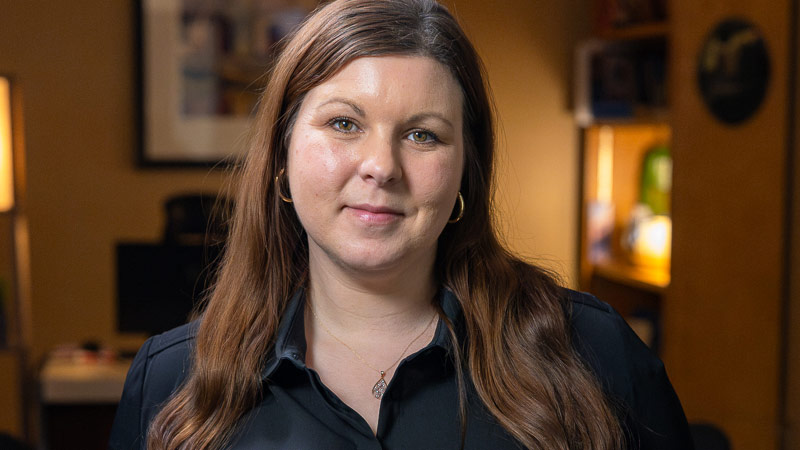From research to real-world impact: Preparing N.B.'s next generation of health professionals
Author: Hilary Creamer Robinson
Posted on Jul 2, 2025
Category: Research , UNB Saint John

Jen Woodland is reshaping health care in New Brunswick by turning research and education into action.
Dr. Jen Woodland doesn’t just study health problems—she solves them—and she is teaching the next generation of health professionals to do exactly the same.
As a researcher with the University of New Brunswick’s (UNB) Integrated Health Initiative (IHI) and a professor in the bachelor of health program, Woodland (MA’09, PhD’15) is a driving force behind the university’s bold mission to transform health research, education and care across the province.
Woodland’s approach to research is pragmatic and hands-on: identify the gaps, dive into the data, uncover the best solutions and then help put those solutions into action. It is research with purpose and it is focused on producing meaningful outcomes for the people of New Brunswick—a mindset she is passing on to bachelor of health students.
“My formal education is much different from the work I do now,” said Woodland. “I studied experimental psychology—specifically human sensation, perception and how our senses work together—but I always had this sense that the work could be useful in real-world contexts, especially in healthcare.”
While her early research focused on an area without an immediate practical application, Woodland saw how it could eventually lead to real solutions.
That instinct became the foundation of her work today.
After earning her PhD in experimental psychology from UNB, Woodland joined Horizon Health Network, where she helped integrate research into medical training and clinical practice. In this role, she worked closely with healthcare providers and students, building programs that supported applied health research in fast-paced clinical environments. This work laid the groundwork for the integrated, solutions-driven approach she now brings to UNB.
For Woodland, simply generating knowledge isn’t enough. The real challenge lies in making that knowledge accessible and applicable in real-world settings.
“We are reimagining how information is shared,” she said. “We are making sure the right people, in the right context, can use the information to make change.
That means translating findings into accessible language for policymakers, clinicians and service providers, so they can make informed decisions and ultimately improve care and outcomes of health.
Woodland's approach is the very embodiment of the IHI’s effort to address complex health challenges by merging research, education and community health. As one of the initiative’s key researchers, she leads efforts to ensure that academic research translates into practical, community-driven solutions.
“We are producing research and finding ways to improve healthcare outcomes in New Brunswick,” she said. “We are working directly with communities, clinicians and students to identify needs, conduct relevant research and ensure those findings are put into practice.”
In her role as a professor, Woodland is training the next generation of healthcare professionals to approach health research critically, strategically and with a solutions-oriented mindset.
“The way we approach problems, the way we collaborate, the way we think about solutions—it is all about impact. I want to show students how they can have that same impact in their careers.”
Woodland and her students regularly produce actionable guidelines, policy briefs and other resources that help service providers evaluate their work and deliver better care. Work that has an immediate, tangible impact on the province’s healthcare system.
“The stakes are real,” she said. “The work we do isn’t just theory—it directly affects New Brunswickers.”
One such project of impact Woodland and her team are currently working on is viable treatment management plans for kids living with asthma in N.B.
She and her team are applying basic science principles from psychology to explore the barriers that make sticking to existing treatment plans difficult. Based on this research, they are developing actionable, evidence-based interventions that will improve patients’ lives.
“This touches on all aspects of research,” Woodland said. “From basic to applied science, it has implications for multiple pillars of health including academic and industry.”
Alongside her role at UNB, Woodland serves on the board of the Saint John Regional Hospital Foundation, which keeps her connected to the healthcare system’s ever-changing needs. This connection is vital to the bachelor of health’s mission of integrating research with practical, real-world solutions.
Within the IHI, Woodland’s innovative approach is a testament to the power of collaborative, applied research and education that prioritizes real-world impact. Through her work in the classroom and beyond, she is shaping the future of healthcare in N.B. and ensuring the next generation of health professionals is equipped to meet the challenges ahead.
Photo credit: Ashley Phinney
